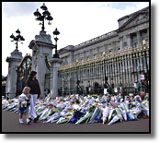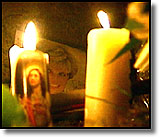
|
A Nation's Loss
The cycle of grief
BBC correspondents' memories
Rarely has the British nation witnessed such an outpouring of raw emotion. The hundreds of thousands of messages of condolence, the carpets of flowers outside palaces and town halls, the vast queues of people waiting to pay their personal tributes. Normally sober British people have broken down in tears when asked for their reactions to the tragedy; even London's commuters have begun talking to each other on trains and buses. The nation has truly come together in grief.
Claire Rayner, Britain's best-known agony aunt, told the BBC's Newshour that we have been undergoing many of the classic symptoms associated with bereavement, often described as the cycle of grief. Shock and disbelief were some of the most common early reactions, swiftly followed by a sense of numbness and unreality, and in some cases anger and guilt. This desire to find someone to blame may have accounted for the often hostile feelings towards members of the press in the early part of the week. In recent days even the Royal family has found itself under attack for its lack of visibility and a perceived failure in responding to the public mood.
A Grief Shared
Counsellors, psychologists and social commentators have offered a variety of explanations for why this tragedy should have hit people so hard. According to Claire Rayner a sudden death is always hard to deal with, partly because of the sense of waste associated with a life cut short.Professor Dirk Keyzer of the University of Bradford says what we've been witnessing is a natural reaction to loss. "She was young, successful, glamorous - all the things we value in society. Now she's been cut short in life… and in a very traumatic way."

|
Others have admitted to being surprised at the way the people appear to have been mourning Diana as if she were a close family friend or relative. Clinical psychologist Oliver James told the BBC's Newsnight programme: "I suppose clinically you'd have to say it's a bit odd if somebody seems to be going into full mourning … if they haven't actually met someone and don't even know them."
But Professor Keyzer points out this is by no means a unique phenomenon: "There are well documented studies where feelings of bereavement follow the deaths of fictional characters in a soap opera". He says that because of her fame " Diana has entered people's consciousness. They feel they know this person, whereas in fact it's the media image they know."
Other commentators suggest we are probably witnessing a complex series of emotions. "There's more than grief here," says Tony Carr, clinical psychologist at the University of Plymouth. "I would describe it more as sadness, rather than the personalised grieving we have when someone close dies."
Coming To Terms With Bereavement
Counselling services have reported a large number of calls for help. A spokesman for the London Association of Bereavement Services, Alan Davidson, says a number of people have already contacted the association and he anticipates a "considerable increase" over the coming weeks. He says that as well as reacting to the death of Princess Diana herself, her death had also "reactivated" people's own grief over earlier bereavements. "This is a natural thing to happen," he said.A spokeswoman for the Samaritans, who offer emotional support for the suicidal and despairing, said they had received a large number of calls from people wanting to talk about their distress. Di Stubbs said: "This sort of event triggers memories of their own tragedies and sadness. It provides a focus for some of the pain." She said many people felt the need to talk and she encouraged anyone experiencing distress to ring or e-mail the organisation. "It really does help," she said.
Professor Keyzer from the University of Bradford agrees. "Expressing feelings openly really does help. It does an individual good", he says "in that they are coping with a sense of loss and the more they can express it the better"

|
Words of Comfort
As with other recent national tragedies, religious leaders have come to the fore, helping people come to terms with their sadness and grief. Extra services have been held across the country.The Archbishop of Canterbury, the Rt. Rev. George Carey, told listeners to BBC Radio: "We cope, for example, by holding on to the things that she believed in, and maybe by her story that human weakness can be transcended by the inner power we have and the grace of God which can cope with the tragedies of life."
The leader of the Roman Catholic community in England and Wales, the Archbishop of Westminster, Cardinal Basil Hume, writes in a text of meditation: "We ask why, why? We did so at Dunblaine and at Abarfan. We do so now".
And the Chief Rabbi, Dr Jonathan Sacks, said: "The Princess of Wales shared her warmth with others and lit the fire of compassion in many hearts. She taught us that by sharing our vulnerabilities we discover strength together".
Full text of religious messages
Related material (The BBC does not endorse the contents of external sites):
The London Association of Bereavement Services
Samaritans
Samaritans e-mail: jo@samaritans.org
Bereavement services on Internet
Grief and loss resource centre
Griefnet is a collection of resources of value to those who are experiencing loss and grief, is sponsored by Rivendell Resources, a non-profit foundation based in Ann Arbor, MI. This web site is mirrored in Europe by GriefNet UK.
In memoriam: a page of links.


